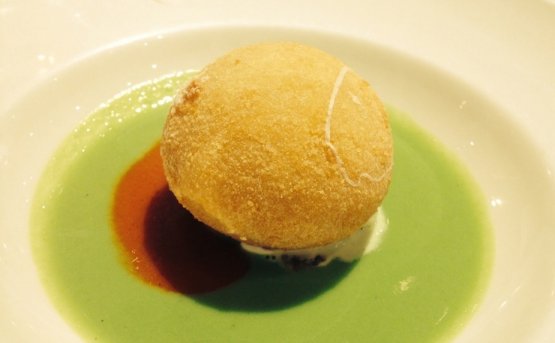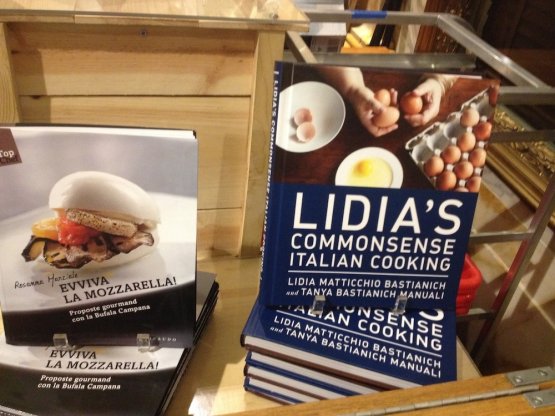The first of the five lessons at Identità New York number five was totally Italian and totally female. Two female chefs, separated by one generation and by the lots of kilometres to cover in order to reach Lidia Bastianich’s native Friuli – she’s long been fully settled in New York – and Rosanna Marziale’s Campania, the fresh face of Le Colonne in Caserta. «There are many women cooking in Italy», Lidia breaks the ice «but men always take all the merits so I’m very happy to be here with a great woman chef from my country, working with great products».

Mozzarella ball, the ball made with buffalo milk mozzarella and filled with capelli d’angelo by Rosanna Marziale
starts at full speed with her mozzarella filled with pasta,
Felicetti’s capelli d’angelo creamed with a basil cream (a pesto yet made without garlic and pine nuts, and with
Grana Padano) and then breaded and fried. «Mozzarella, pasta and frying, 3 very Italian symbols», she proudly listed. The mozzarella was made with buffalo milk, of course «because you can tell the wild flavour». It looks like a real
ball, a term, palla, which recalls the traditional dialect of Caserta. After having filled it with pasta, it is rolled in flour, beaten egg and white breadcrumbs, a process that needs to be repeated twice. This Campanian circle is closed by a sauce made with sweet peas in contrast with the grilled piennelo tomatoes and the braised and strained scallion.

The books of the two speakers were well displayed at the entrance
With
Lidia, however, we don’t move to her origins in Friuli (which, however, we can find in the glass of Vespa Bianco wine served as a pairing) but to Bagnara in Calabria. Indeed there’s chilli pepper in her recipe, together with some large leaves of endive which she brandishes right afterwards together with anchovies and black garlic. A second summary of Italian essence, summed up with straight words by one of the most efficient ambassadors of our flavours on the other side of the Ocean. «I opened my first restaurant in 1971», she recalls «when you couldn’t find any
Grana Padano, or extra virgin olive oil over here. How did I make it? I made do, with lots of soups, fish soups and fresh pasta. Luckily many things have changed over the decades ».
«The swordfish is excellent because it is perfectly cooked and full of juices»,
Paolo Marchi remarks at the end of the lesson, before leaving time to a series of questions, on the longevity of mozzarella and of its liquid. With one clarification made by Marziale, when questioned by the audience in New York with regards to the preservation of stretched cheese: «I couldn’t even think of bringing some cold mozzarella close to my mouth».